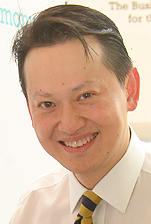 Five years ago he had not received any economics or management training. Three years ago he knew nothing about agriculture. However, David Shao is now general manager of the Vegetable Seeds Division of Monsanto Company, one of the world’s leading agriculture companies. Five years ago he had not received any economics or management training. Three years ago he knew nothing about agriculture. However, David Shao is now general manager of the Vegetable Seeds Division of Monsanto Company, one of the world’s leading agriculture companies.
Shao spent his early twenties in Shanghai. After the freshman year in medical school, he transferred to the US and got his bachelor’s degree in science. After graduation he joined the electronics industry. Twenty years passed and he grew up to become a middle manager for Emerson, a Fortune Global 500 technology company.
Although he was offered several EMBA programmes in Europe, management education in Asia was what he always dreamed of. And then the Tsinghua-INSEAD EMBA (TIEMBA) programme appeared on his list. He remembers, “It was just like it was tailored for me – based in several countries including China, high-quality professors, diverse classmates, and combining the strengths of both the well-known Tsinghua University and the famous INSEAD business school.”
In 2012, three years after Shao’s graduation, the TIEMBA programme entered the prestigious Financial Times EMBA ranking at fourth place. He regards this result as encouraging and deserved. As he says, “An excellent EMBA programme shouldn’t make you better at what you are already doing; it should encourage your confidence and broaden your scope.”
The key ingredients of success
The confidence he gained from the TIEMBA programme was one of the key ingredients in his transfer from the technology business into the agriculture business. He regards timing as another important ingredient: the headhunting company and his current boss were both full of imagination at the same moment he was ready for a career change.
On his way to success, Shao met some special people. He remembers his supervisor back in Singapore as the first to interest him in transnational enterprises. He also has particularly fond memories of Li Daokui and Qian Yingyi's classes. He even attended their classes for Chinese EMBA students and recalls: “The Chinese versions are much more splendid! For one thing, professors are more at ease when teaching in their mother tongue; for another thing, the Chinese students are real soldiers in Chinese market battles, with on-the-ground experiences and puzzles, so their questions are much more vivid.”
Shao feels strongly attached to Tsinghua, from which he benefited and to which he tries to give back. “I even rearrange my business schedules to take part in the alumni panels,” he says. “It is worth the time and energy since classmates from diverse backgrounds and experience promote better thinking.” In addition, the “tsinger” identity offers great benefits, “simply because a large proportion of officials in China graduated from Tsinghua and we share the same root.” But you cannot expect them to break the rules, he insists. “To do business with government, you should follow three guidelines: to obey the rules; to establish personal trust; and to prioritise the government’s interest.”
The importance of agriculture
In Shao’s view, the essence of doing business in China is government – not only because regular communication with officials is necessary but also because the agriculture business is tightly related to the people and their way of life. He interviews farmers before making business plans, listens to their opinions and concludes that: “It is the peasants who know most about seeds and fruits, the cost and the harvest, although they cannot express it in terms of theories.”
Shao believes there is still a lot to do to improve the foreign seed industry in China: “Ideally, the government and industry should sit down together to negotiate a solution and guide the localisation of foreign seed resources for the future benefit of Chinese agriculture.”
In essence, according to Shao, the seeds industry is selling patents, rather than seeds or products, and it is a pity that intellectual property protection is weak in China. The Monsanto Company invests 3,870,000 dollars on R&D per day. This is a huge amount of investment, which exceeds yearly revenues of some domestic agriculture companies. As a result, foreign companies are very discreet about choosing markets. Given the huge amount of investment, they suffer significant losses once an idea is copied. But Shao hopes the Chinese government will take steps to protect foreign enterprises’ intellectual property and thus encourage the cultivation of seeds more adjusted to the local conditions. “Just to give you an example,” he says, “if you can develop drought- resisting seeds, large areas of desert in China could bring huge economic returns.”
Rich economic returns would attract high-quality human resources, and would solve the structural problems of Chinese agriculture. Traditionally, farming has a humble social and economical status, and thus suffers from talent shortages. David says, “There lies the big challenge as well as the big opportunity ahead: to promote the virtuous cycle of Chinese agriculture, which has played such an important role in the rise of the nation.”
|  Latest News
Latest News